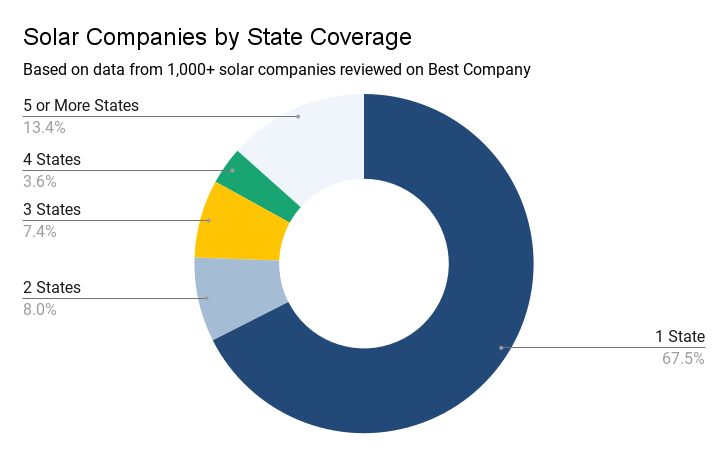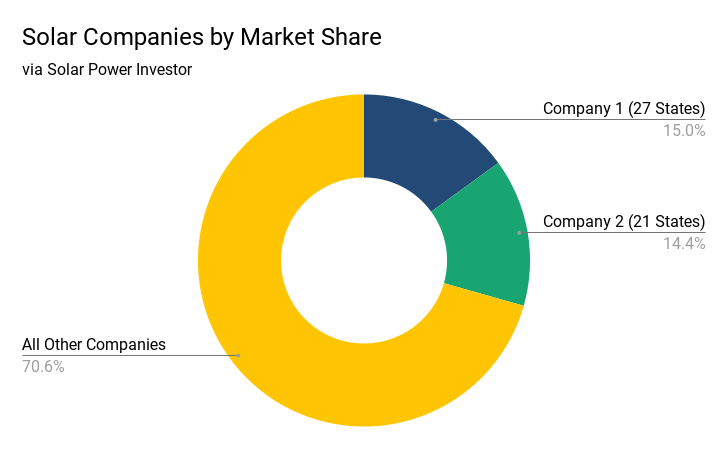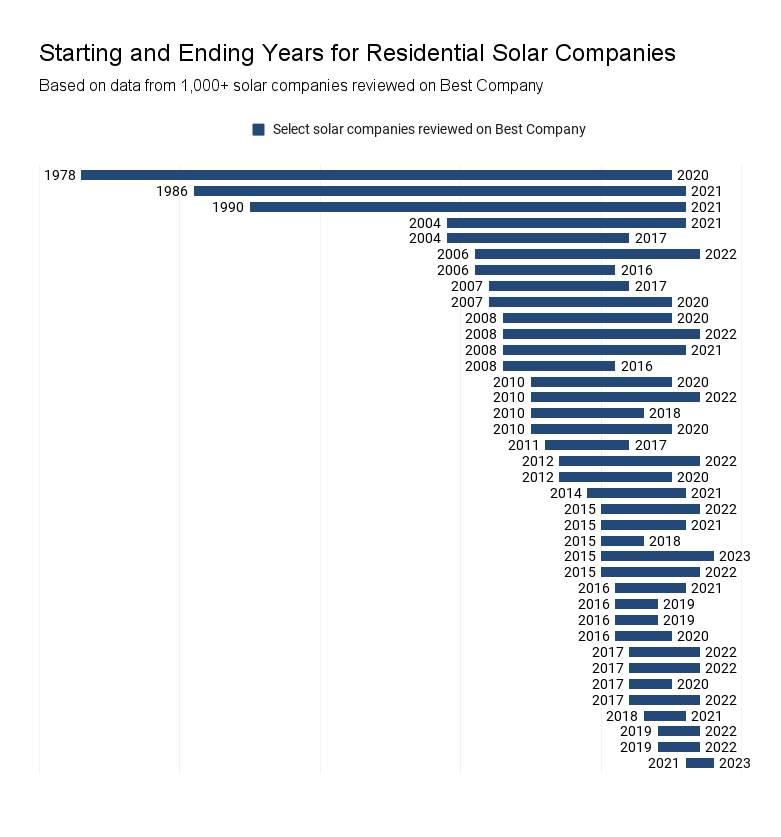Which (Type of) Solar Company Is Best for Me?
It’s no secret that the cost of residential solar has plummeted over the past two decades. Rapid advances in solar technology, increased demand from homeowners, and government incentives like the recently passed Inflation Reduction Act have allowed solar product manufacturers to build high-efficiency solar panels, inverters, and batteries at a faster pace, higher volume, and lower price.
With cost being one of the most formidable barriers to entry for new solar companies, the falling market price of solar has been accompanied by a steadily increasing cohort of new solar providers entering the market each year:

The sheer increase of new solar companies vying for residential contracts represents a rapidly evolving installer landscape that has shifted from a handful of national providers to a diverse field of installers, brokers, one-stop shops, and specialists spanning anywhere from a select number of neighborhoods in the same city to all 50 states.
As a result, the prospect of selecting just one from the hundreds of possible candidates can be a daunting task for even the most diligent researcher. So we’ve identified some of the major categories that residential installers fall into and we explored the pros and cons.
National vs. Local
One of the most obvious divisions within the solar industry — and the one that has perhaps become the most pronounced in recent years — is between large, multi-state or national solar providers, and small, locally based ones.
Of the 1,000+ solar companies currently reviewed on Best Company, nearly 70 percent advertise a one-state service area. But, according to Solar Power Investor, less than one percent of reviewed companies (national installers like SunPower, ADT Solar, and Sunrun) account for roughly 30 percent of the total market share of the residential solar market.


Solar providers with broad, multi-state service areas tend to possess more resources and options than local providers. They have bigger marketing budgets, larger customer bases, and more robust support departments. Every instance of a successful installation or satisfied customer can be easily broadcast to thousands or even millions of potential customers on social media.
Additionally, larger companies can give customers access to more diverse and flexible financing options, including solar leases and power purchase agreements (PPAs) that can make solar even more affordable. Larger companies also tend to have more longevity than smaller ones and are less likely to close.
Conversely, local providers are often staffed by local experts with in-depth knowledge of municipal building codes and regulations and the culture and preferences of a narrowly targeted audience.
This subset of providers can also appeal to homeowners interested in supporting local businesses and keeping their money in the community. The majority of female-, minority-, and veteran-owned solar companies serve local areas as opposed to national areas.
Key Takeaway
The preference for a national or a local solar provider has more to do with taste than anything else, not dissimilar to whether you prefer a major fast food franchise or your local burger joint. In short, larger companies are about the what, and smaller companies are about the who.
Full-Service vs. Specialty
At first glance, full-service solar companies have a distinct advantage over specialists — specifically in the way they set themselves up as “one-stop” shops for all things solar: consultation, auditing, design, permitting, installation, and maintenance. The majority of solar companies reviewed on Best Company identify as “full-service”.
One of the chief complaints among existing solar customers is the pain of communicating with multiple solar companies across different phases of the solar installation process, from design to permitting, to installation, to monitoring, and to customer support.
And this is the problem that many full-service solar companies were founded to solve.
A full-service company, ideally, handles every stage in-house. That means the company that conducts the initial energy audit and site survey is the same company that installs the panels and answers the phone if something goes awry.
But even within a full-service company, departmental silos can create numerous problems for customers, particularly at the point where the customer’s account changed hands between the salesperson and the project manager; about 40 percent of customer reviews specifically mentioning project managers were negative. Misplaced paperwork, incorrect or delayed orders, and difficulty reaching customer service likewise contributed to negative reviews.
The true appeal of a full-service company is its ability to offer multiple system upgrades under one roof. Solar battery storage, electric vehicle charging, and real-time system monitoring are just a few examples of upgrades customers receive at a discounted price when they bundle with a solar panel system.
That said, if needs are simple and the budget is limited, obtaining an expert-installed solar panel system from a specialist with none of the additional bells and whistles might be the better option. Just remember, you may need to reach out to other companies to help with design, permitting, and other phases of solar installation.
Key Takeaway
Whereas the previous section centered on taste, the debate between specialty solar providers and one-stop shops focuses on need. As communication problems with either type of company are a real possibility, the question to answer is what you need from a solar company. Go with a full-service provider if any of the following apply:
- You live in an area prone to blackouts or power outages
- App-enabled monitoring is important to you
- You don’t want to deal with multiple points of contact
The Top Solar Companies



Industry Veterans vs. New Entrants
The residential solar industry has been around for more than fifty years, with a small percentage of companies in operation having opened their doors in the mid-1970s. Thanks to industry advances and certification programs, a company no longer needs to be approaching middle age to be considered an industry veteran.
More than 50 percent of solar companies on Best Company were founded in or after 2013. But the question of whether to go with a provider with decades of experience of a new up-and-comer remains.
The obvious appeal of a solar company that has been around for a while is its track record. Older companies tend to showcase their portfolios and the fact that they’ve remained in business for so long as evidence of their quality and value. On Best Company, companies with more than 10 years of experience on average earn 3.8 out of 5 stars, which is slightly better than the 3.6 average earned by solar companies with fewer than 10 years of experience.
Newer companies were more negatively impacted by the Covid-19 pandemic than more experienced companies. Of the 29 Best Company–reviewed solar providers that closed after 2019, 70 percent of them had start dates of 2010 or later.

Not only do older companies have more brand recognition in their respective communities than newer solar providers, but this subset also has more established relationships with industry partners — product manufacturers, financing companies, subcontractors, etc. — which can translate to lower costs for the consumer.
On the other hand, newer solar companies are more likely to embrace new technologies and work harder at establishing a reputable online presence than more experienced companies. Of the more than 30,000 verified solar reviews posted to Best Company, roughly a third of them are in reference to companies founded in the last decade. New entrants also tend to focus on social responsibility and sustainability, and establishing an end-to-end environmentally friendly business model.
Key Takeaway
Older solar companies are anything but rigid; their ability to adapt to the changing solar landscape and shifting economic pressures is the reason why many of them continue to thrive. And while newer companies perhaps have more to prove than their seasoned counterparts, their drive to apply new approaches to residential solar is what is ultimately moving the industry forward.
Home Improvement + Solar
An increasingly popular business model in the home energy upgrade market is to add solar energy to an existing suite of home improvement options. As the price of solar continues to drop and the value of government incentives increases, more and more companies are viewing solar energy as a lucrative addition to their business.
This business model has its own set of pros and cons, the main pro being the practical and monetary convenience of working with a whole-home upgrade company. Bundling services like electrical, HVAC, insulation, roofing, and solar with the same contractor saves time and money and reduces the number of moving parts and contact points.
But this type of company tends to be limited in terms of product selection and overall solar expertise. When solar installation is not the main part of the business, the company may dedicate fewer resources to providing high-quality products and advanced technician training than a specialized solar provider, risking a lower-quality build with potentially inferior products.
Key Takeaway
This company type is best for homes that require multiple home upgrades or repairs at once — new builds or fixer-uppers.
Solar Brokers
On the other side of the spectrum, home improvement providers with a solar arm are solar brokers. These companies do not directly install solar panel systems but rather match homeowners with an installer from a curated list. Again, this approach has its advantages and fallbacks.
For starters, a solar broker can significantly reduce the amount of time homeowners spend looking for a solar company that both services their geographic area and matches their needs. Providers are handpicked by experts who have developed relationships with companies; in some cases, these working relationships can translate to discounts for the customer.
Some solar brokers may charge additional fees to the consumer for a successful match, and their partnerships with installing companies may introduce a level of bias that could benefit the broker more than the homeowner.
Key Takeaway
Solar brokerage requires a great deal of trust in order to work — trust that the broker’s obligation to the bottom line aligns with the client’s needs. As mentioned at the start of this article, the residential solar market is inundated with thousands of diverse solar providers, and a solar broker ideally eliminates much of the guesswork that goes into the evaluation process.
If you decide to go this route, vet the broker thoroughly! Read customer reviews, investigate the installers it works with, and read their customer reviews. Arm yourself with as much knowledge as possible before signing the dotted line.
![Which type of solar company is best for me? [Infographic] Choices such as national provider, local provider, industry veteran, etc.](https://images.bestcompany.com/blog/which-type-of-solar-company-is-best-for-me-infographic.png)
This very well may be the golden age of solar. Prices have never been lower, competition to provide quality service for families and homes of all shapes, sizes, and budgets has never been higher — and if you know what to look for, finding the right type of solar company has never been easier.
Top Solar Companies Near You
Want to learn more about companies near you? Read up on the top solar providers in your area.
Learn MoreRelated Articles
November 24th, 2024
Solar
The Best PV Solar Panels
By Best Company Editorial Team
May 29th, 2024
By Carlie Ellet
May 21st, 2024
Get Our Newsletter - Be in the Know
Sign up below to receive a monthly newsletter containing relevant news, resources and expert tips on Solar and other products and services.
We promise not to spam you. Unsubscribe at any time. Privacy Policy